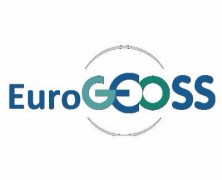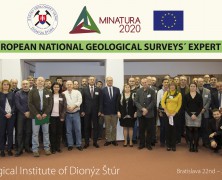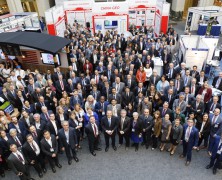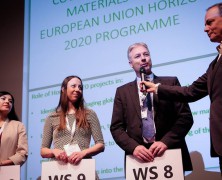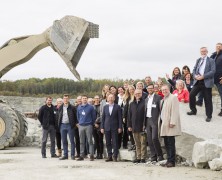EuroGEOSS is the European component of the Global Earth Observation System of Systems (GEOSS) with a focus on coordinating and scaling up user-driven applications being developed in Europe. This GEO regional initiative aims to improve user uptake of Earth Observation data and improve forecasting capabilities for sound decision-making by governments for Europe’s benefit. The Group on Earth Observations (GEO) – a global effort to increase our understanding of Earth processes and improve forecasting. GEO is a partnership of more than 100 governments, 100 participating organisations and the European Commission. GEO implements GEOSS – decisions and actions for the benefit of humankind are informed by coordinated, comprehensive and sustained Earth observations. To get more details about EuroGEOSS visit the website and click here to download the infographic....
Tailoring Earth Observation Services to Europe’s needs – Coordinate, combine & cooperate
posted by EuroGeoSurveys
Central European National Geological Surveys’ Expert Workshop
posted by EuroGeoSurveys
Based on the conclusions from the Central European (CE) National Geological Surveys (NGS) Directors’ meeting in Maribor, May 2017, the State Geological Institute of Dionyz Stur initiated, hosted and organized on 22nd and 23rd November 2017 in Bratislava the first workshop of experts from the CE NGSs of Slovenia, Croatia, Hungary, Austria, Czech Republic, Poland and Slovakia. This event was attended by Secretary General of the EuroGeoSurveys, Slavko Solar as well. The purpose of the workshop was to find out the real potential and fighting power of the mentioned geological surveys. In total 41 foreign and Slovak experts presented the actual state of affaires and exchanged their experiences within four working groups for geological mapping, raw materials, hydrogeology including geothermal energy and geohazards. The findings and facts will be the subject of analysis and elaboration of recommendations for future prospective cooperation in Central Europe. ...
Insight for a Changing World: 14th Group on Earth Observation plenary
posted by EuroGeoSurveys
Last 23-27 October, the Group on Earth Observation (GEO) community came together at the Ronald Reagan Building in Washington, DC. to hold the 14th Group on Earth Observation plenary. About 700 people in attendance met to discuss the importance of making Earth observations data available and more readily accessible. “We are moving from a data-centric approach to a user-centric approach” highlighted GEO Secretariat director, Barbara Ryan, during the opening of the plenary. “It’s about closing the gap between users and providers”. GEO is a partnership of more than 100 national governments, 100 participating organizations and the European Commission. GEO implements the GEOSS, the global Earth observation system of systems. It envisions a future where decision and measures for the benefit of humankind are informed by coordinated, comprehensive and sustained Earth Observation. To implement this vision, GEO has divided the world into five regional areas. Europe is one of them and EuroGEOSS is the framework to combine the contributions of European GEO members. In order to support GEOSS, the EuroGeoSurveys Earth Observation and Geohazards Expert Group (EO EG) is leading one GEO Community Activity on Earth Observations for GeoHazards, land degradation and environmental monitoring included in the GEO Work Programme. The EO EG is also working on updating an European landslide inventory as well as creating an European landslide density map. This dataset is available to the public, scientific institutions and the broad spectrum of geoscience and risk management organisations. In addition, the group focuses on using Copernicus data for geological and anthropogenic hazard mapping such as landslide and subsidence dynamics, soil degradation and contamination. The EGS EO EG is currently working towards an implementation of future ground motion Copernicus services pushing the involvement of Geological Surveys in such processes. Underscoring the importance of Earth observations,...
Accelerating the resource revolution: World Resources Forum 2017
posted by EuroGeoSurveys
The annual World Resources Forum WRF 2017 was held in Geneva, Switzerland on the 24th and 25th October 2017 with over 400 participants. Two years after the establishment of two historic global agreements – the 2030 Agenda for Sustainable Development with its 17 Sustainable Development Goals (SDGs) and the Paris Agreement on Climate Change – leaders and other agents from government, business, research and NGOs came to “UN capital” Geneva, to talk about how to accelerate the Resource Revolution. The two-day conference was opened by Valentin Zellweger, the Permanent Representative of Switzerland to the United Nations in Geneva. Partner workshops were held on various topics related to the main theme of the WRF 2017 conference, including workshop “International Cooperation on Raw Materials in the European Union Horizon 2020 Programme”, organized by the FORAM Management Committee in coordination with the European Commission. This workshop is related to the Horizon 2020 funded project, FORAM, which aims to develop a platform of international experts and stakeholders that will enhance the international cooperation on raw material policies and investments: Advancing the idea of a World Forum on Raw Materials. Other projects participating in this workshop were four H2020 projects covering the subjects of the International Cooperation Pillar (FORAM, MinFuture, INTRAW and STRADE), eight projects covering the Non-Technology Pillar (MICA, MIN-GUIDE, MINATURA 2020, ProSUM, SCRREEN, MSP-REFRAM, SMART GROUND, IMPACTPapeRec) and one project from the Technology Pillar (VERAM), all in the framework of the framework of the Strategic Implementation Plan (SIP) of the European Innovation Partnership on Raw Materials and in the funding scheme of Coordination and Support Actions (CSA). They have been chosen for the workshop to improve framework conditions and international cooperation in the raw materials sector from different perspectives. These projects were expected to share their experiences, increase each...
Estonia hosted the 10th Anniversary European Minerals Day Launch event!
posted by EuroGeoSurveys
From 22-24 September, more than 130 quarries and plants in 27 countries opened their doors welcoming around 30.000 children and adults to celebrate European Minerals Day and have the rare opportunity to explore the world of minerals and experience how they are sustainable extracted. Typical activities include school visits, guided tours, workshops, exhibitions, biodiversity projects, and many more have been organised. Slavko Solar, EuroGeoSurveys Secretary General stated during the launch of the European Minerals Day event: “These events convinced me that mine or quarry relationships with local community are crucial to obtain, and moreover maintain the social licence to operate. This, next to other communication activities that present mine operation , transparently opens the doors to public awareness, acceptance and finally trust as wishfully written in the EU Document entitled EIP Strategic Implementation Plan.” The 2017 European Minerals Day Launch took place on 21 and 22 September, hosted under the Estonian EU Presidency, kindly hosted by Nordkalk and Kunda Nordic Tsement at their operations in Kurevere and Kunda. It welcomed representatives from the European Commission, Estonian government, partnering sectors, academia, NGOs, media and local administrations. The balanced and insightful presentations by the guest speakers was complemented by visits of both quarry operations, the cement plant and port in Kunda, a blasting in Kurevere and introduction to the local biodiversity projects on birds and orchids. The sector is important to the EU jobs and growth agenda as it directly employs around 1 million people across 30,000 active mines, quarries and plants in Europe, and has an annual turnover of more than €150 billion. The minerals sector forms an integral part of the European value chain with 70% of EU manufacturing depending on the minerals, metals and raw materials mined. “We need to keep jobs, growth, investment and...

